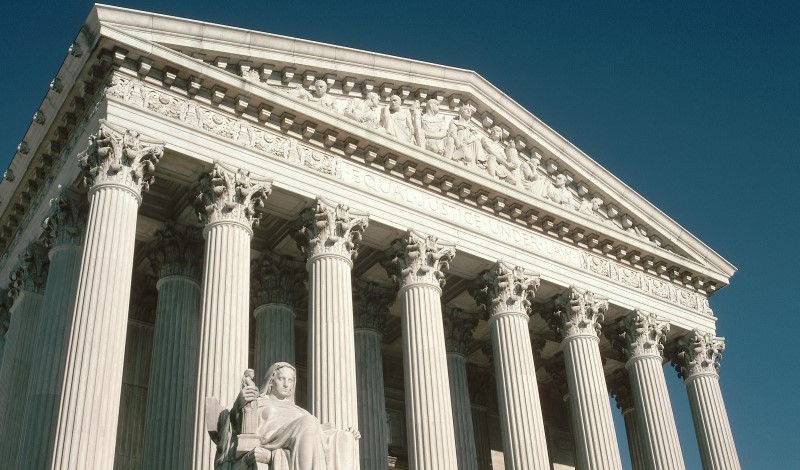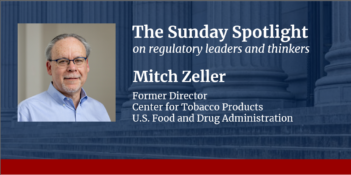
In deciding whether to overrule the Chevron doctrine, the Supreme Court should not be persuaded by mistaken invocations of a famous dictum.
“It is emphatically the province and duty of the judicial department to say what the law is.”
That quotation from the U.S. Supreme Court’s famous 1803 opinion in Marbury v. Madison has been recited thousands of times. Most of the time, however, it is taken out of context and cited to support a proposition that it cannot support. For instance, it is currently being used as one of the main arguments in support of the effort to overturn the Chevron doctrine that the Supreme Court is re-considering in Loper Bright Enterprises v. Raimondo.
In its 1984 opinion in Chevron v. NRDC, the Court announced and applied a two-part test for reviewing an agency’s interpretation of a statute:
When a court reviews an agency’s construction of the statute which it administers, it is confronted with two questions. First, always is the question whether Congress has directly spoken to the precise question at issue. If so, that is the end of the matter; for the court, as well as the agency, must give effect to the unambiguously expressed intent of Congress. If, however, the court determines that Congress has not directly addressed the precise question at issue, the court does not simply impose its own construction on the statute, as would be necessary in the absence of an administrative interpretation. Rather, if the statute is silent or ambiguous with respect to the specific issue, the question for the court is whether the agency’s answer is based on a permissible construction of the statute.
The petitioner’s brief in Loper Bright is a good example of a document that challenges the Chevron doctrine by quoting Marbury out of context. The brief quotes Marbury and then states that a court’s duty “to say what the law is” must also “include saying what the law is in close cases even when the authorities at issue are murky or silent.” The brief, though, does not cite any case to support that extended proposition—and for a good reason. Neither Marbury nor any other nineteenth century opinion supports the argument that the courts, rather than agencies, must be the primary or sole authority of what the law is in cases of statutory silence or ambiguity that involve agency rulemaking.
As Jerry Mashaw has explained in detail, the Marbury opinion was one of many 19th century opinions in which the Court described and applied a dichotomous framework that it used to decide whether and how to review agency actions throughout the century. In Marbury, the Court concluded that Secretary of State James Madison could not lawfully refuse to deliver to William Marbury his commission as justice of the peace in the District of Columbia because he had been nominated by the President and confirmed by the Senate—the precise constitutional prerequisites for his appointment. The Court emphasized that it was reviewing the decision of the Secretary to take a “ministerial act,” as distinguished from an act in which an officer has some degree of discretion.
Both in its opinion in Marbury and in many other 19th century opinions, the Court consistently distinguished “ministerial acts” from “discretionary acts.” It defined a ministerial act as “one in respect to which nothing is left to discretion. It is a simple, definitive duty, arising under circumstances admitted to exist and imposed by law.” That is the narrow and rare context in which the Court announced and applied its famous dictum in Marbury.
By contrast, the Court consistently held that the judiciary could play no role in reviewing any discretionary action taken by an officer, including statutory interpretation. The legal regime applicable to agencies in the 19th century was simple. In the rare case of a ministerial duty, a court’s job was to determine the law and apply it to the agency. In all other cases, agency action was unreviewable. Thus, for instance, the Court characterized an action as discretionary and unreviewable because it required “careful consideration and construction of more than one act of Congress.”
I am not arguing for a return to the legal regime that existed when the Court decided Marbury. The Supreme Court replaced that legal regime with the modern appellate review model in 1902 for good reasons. I much prefer the modern legal regime in which courts review most agency actions but use a deferential approach that respects the fact that they are reviewing the decisions of officers in a separate and co-equal branch of government.
In fact, I agree with Loper Bright’s argument that the Court should overrule Chevron. Loper Bright accurately characterizes my position in its brief. I do not think that the Chevron test produces acceptable results in the conditions of extreme political polarization that now afflict the country. The Chevron test has the potential to create a nation with an extremely unstable legal regime in which most major policy decisions are reversed every four to eight years.
I think the nation would be much better off if the Court were to replace the Chevron test with the test the Court announced and applied in its 1944 opinion in Skidmore v. Swift & Co., namely that:
We consider that the rulings, interpretations, and opinions of the Administrator under this Act, while not controlling upon the courts by reason of their authority, do constitute a body of experience and informed judgment to which the courts and litigants may properly resort for guidance. The weight of such a judgment in a particular case will depend upon the thoroughness evident in its consideration, the validity of its reasoning, its consistency with earlier and later pronouncements, and all those factors that give it power to persuade, if lacking power to control.
The Skidmore test combines respect for the views of agencies with the values of a stable and predictable legal regime that an agency can change only when it can support a change with good reasoning supported by science and facts.
My point in this essay is much more modest. In deciding whether to overrule Chevron, the Court should ignore the famous but irrelevant dictum in Marbury v. Madison.




